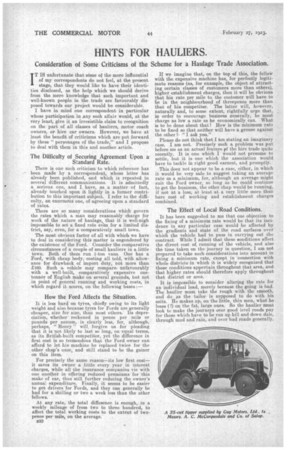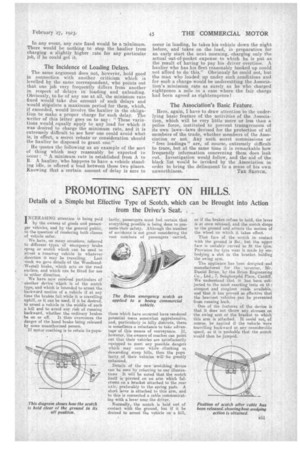HINTS FOR HAULIERS.
Page 14

Page 15

If you've noticed an error in this article please click here to report it so we can fix it.
Consideration of Some Criticisms of the Scheme for a Haulage Trade Association.
IT IS unfortunate that some of the more influential of my correspondents do not feel, at the present stage, that they would like to have their identities disclosed, as the help which we should derive from the mere knowledge that such important and well-known people in the trade are favourably disposed towards our project would be considerable.
I have in mind one correspondent in particular whose participation in Any such affair would, at the very least, give it an irresistible claim to recognition on the part of all classes of hauliers, motor coach owners, or hire car owners, However, we have at least the benefit of criticisms which are put forward by these " personages of the trade," and I propose to deal with them in this and another article.
The Difficulty of Securing Agreement Upon a' Standard Rate.
There is one such criticism to which reference has been made by a correspondent, whose letter has already been published, and which is repeated in several different communications. It is admittedly a serious one, and I have, as a matter of fact, already touched upon it lightly in a, former contribution to this important subject. I refer to the difficulty, an enormous one, of agreeing upon. a standard of rates.
There are so many considerations which govern the rates which a man may reasonably charge for work of the nature of haulage, that it is well-nigh impossible to set a fixed rate even for a limited district, say, even, for a comparatively small town.
The most obvious factor of all with which we have to deal in considering this matter is engendered by the existence of the Ford. Consider the comparative circumstances of a couple of small hauliers in a little town. Both of them run 1-ton vans. One has a Ford, with cheap body, costing all told, with allowance for drawback of import duty, not more than 1180. Such avehicle may compare. unfavourably with a well-built, comparatively expensive onetonner of English make on several grounds, but not in point of general running and working costs, in which regard it scores, on the following bases :—
How the Ford Affects the Situation.
It is less hard on tyres, chiefly owing to its light weight and also because tyres for Fords are generally cheaper, size for size, than most others. Its depreciation, whether reckoned in pence per mile or pounds per annum, is clearly less, for, although, perhaps, " Henry " will, forgive us for pleading that it is not likely to last so long, on equal terms, as its British-built competitor, yet the difference in first, cost is so tremendous that the Ford owner can afford to let his machine be replaced twice for the other chap's once, and still stand to be the gainer on this item.
For precisely the same reason—its low first cost— it saves its owner a little every year in interest charges, while all the insurance companies vie with one another in offering reduced premiums for this make of car, thus still further reducing the owner's annual expenditure. Finally, it seems to be easier to get drivers for Fords, and they can generally be had for a shilling or two a week less than the other fellows.
At any rate, the total difference is enough, in a weekly mileage of from two to three hundred, to affect the total working costs to the extent of twopence per mile, on the average.
530
If we imagine that, on the top of this, the feIloW with the expensive machine has, for perfectly legitimate reasons (as, for example, the object of attracting certain classes of customers more than others), higher establishment charges, then it will be obvious that his rate per mile to the customer will have to be in the neighbourhood of threepence more than that of his competitor. The latter will, however, naturally and, to some extent, rightfully urge that, in order to encourage business eenerally, he must charge as low a, rate as he economically can. What is to be done about that? How is the minimum rate to be fixed so that neither will have a grouse against the other?, " I ask you."
Please do not think that I ean stating an imaginary ease. I am not. Precisely such a problem was put before me as an actual feature pf the hire trade quite recently. It is one which I would not presume to settle, but it is one which the association would have to tackle in right good earnest, and promptly.
This does not appear to be a case, either, in which it would be very safe to suggest taking an average rate as a minimum, for, although an average might suit the Ford owner, so long as he could continue to get the business, the other chap would be running, if not at a loss, at least at a very little more than bare cost of working and establishment charges combined.
The Effect of Local Road Conditions.
It has been suggested to me that one objection to the fixing of a minimum rate would be that its incidence in any particular case would be affected by the gradients and state of the road surfaces over which the vehicle had to pass in carrying out the contract. While I admit that these sonditions affect the direct cost of running of the vehicle, and also the time taken on the journey in question, I am not prepared to take such considerations into account in fixing a minimum rate, except in connection with whole districts in which it is widely recognized that those conditions appertain throughout that area, and that higher rates should therefore apply throughout that district or area.
It is impossible to consider altering the rate for an individual load, merely because the going is bad. The haulier must take the rough with the smooth, and do as the tailor is supposed to do with hie suits. He makes up, on the little, thin men, what he loses (?) on the fat, large ones. So the haulier must look to make the journeys over good level roads pay for those which have to be run up hill and down dale, through mud and rain, and Over bad roads generally.
In any event, any rate fixed would be a minimum. There would be nothing to stop the haulier from charFing a slightly higher rate for any particular job, if he could get it.
The Incidence of Loading Delays.
The same argument does not, however, hold good in connection with another criticism which is levelled by the same correspondent, who points out that one job very frequently differs from another in respect of delays in loading and unloading. Obviously, to be of any use at all, the minimum rate fixed would take due account of such delays and would stipulate a maximum period for them, which, if exceeded, would involve the haulier in the obligation to make a proper charge for such delay. The writer of this letter goes on to say: " These variations would equally apply to any load for which it was desired to charge the minimum rate, and it is extremely difficult to see how one could avoid what is, in effect, a secret rebate or consideration should the haulier be disposed to grant one."
He quotes the following as an example of the sort of thing which may reasonably be expected to occur : A minimum rate is established from A to B. A haulier, Who happens to have a vehicle standing idle, is offered a load between those two places. knowing that a certain amount of delay is sure to occur in loading, he takes his vehicle down the night before, and takes on the load, in preparation for an early start the next morning, charging only the actual out-of-pocket expense to which he is put as the result of having to pay his driver overtime. A haulier who has his fleet reasonably booked up could not afford to do this." Obviously he could not, but the man who loaded up under such conditions and for such a charge would be undereutting the Association's minimum rate as surely as he who charged eightpence a mile in a case where the fair charge had been agreed as eighteenpence!
The Association's Basic Feature.
Here, again, I have to draw attention to the underlying basic feature of the activities of the Association, which will be very little more or less than a police force, instituted to prevent transgression of its own laws—laws devised for the protection of all members of the trade, whether members of the Association or not. Any such secret commissions or "free loadings" are, of course, extremely difficult to trace, but at the same time it is remarkable how frequently information concerning them does leak out. Investigation would follow, and the aid of the black list would be invoked by the Association in ordet to bring the delinquent to a sense of his own unworthiness. THE SICOTC11.,




























